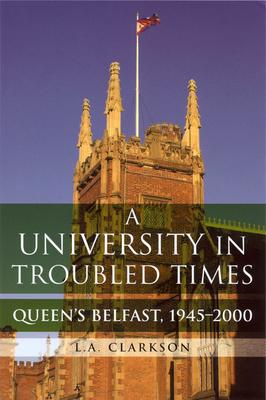A University in Troubled Times
Shayla Warmsley reviews A university in troubled times: Queen's, Belfast, 1945-2000 by Leslie A Clarkson, Four Courts Press, ISBN 1-85182-862-1, £45, 45 euro hbk

ACKNOWLEDGING A subsidy from his subject, Clarkson denies that Queen's "attempted to impose any sort of official line". The problem - and this is not to impugn the historian's integrity - is that you never quite forget that the sponsor and the subject are one and the same
True, Clarkson comes close to critical. By dismissing the idea of expansion in the 1960s, for instance, "Queen's played its hand badly and had to live with the consequence for the rest of the century." But you can't help wondering how much more critical he might have been had this history not been commissioned by its subject.
Official historians have access to every imaginable data set - and, God knows, Clarkson has used pretty much all of them. Want to know how much Queen's spent on computing services between 1945-1949? Really? He can tell you.
Beyond a readership of anachronistic accountants, if this book has more than parochial value it is because it poses this question: what are universities for? Human capital and the enrichment of cultural life, he suggests - in other words, professional wages and copy for the culture pages. You need not sign up to strive for the greater glory of God to want more of tertiary education than this. Successive vice-chancellors at Queen's certainly did.
But it turns out that the current dichotomy between "relevance" and excellence is not new. Cardinal John Henry Newman, the great advocate of academia, envisaged universities that disseminated but did not advance knowledge - that is, universities without research. Even in the mid-1960s, some within Queen's were still trying to offload non-degree courses.
And there's a second question: what social role does a university such as Queen's
have? The awkward political context appears to be an embarrassment for Clarkson. "A distinctive feature of society in Northern Ireland is an acute awareness of the denominational split between Protestants and Roman Catholics," he warns his (presumably Martian) readers.
At Oxford and Cambridge (just so you know which universities it counts at its peers), there is little truck between town and gown. In contrast, Queen's is "intimately related to its local community". Yet when attackers repeatedly firebomb university buildings at the end of the 1960s, Clarkson remarks only that they "compelled the University (note that Oxbridge upper-case U) to spend money" on security. That actuarial tendency again.
The lack of social responsiveness, rather, is the story between the lines. Catholics, grown uppity with increased numbers and increased wealth, were demanding more places for their own kids - just over 20 per cent in 1954 to more than 50 per cent (and a Protestant backlash) in 1987.
Later, the University of Ulster gave Queen's a run for its money. When Ulster poached business courses from Queen's in the 1980s with little effort, the move "strengthened a popular belief that Queen's was not really interested in serving the local community."
Finally, occasionally, it is difficult to decide between idiosyncratic editing and political point-scoring. By the end of 2001, Clarkson points out, there was a 'peace process'. Whatever he thinks of the Good Friday Agreement and its aftermath , the process doesn't need inverted commas.
Connolly Association, c/o RMT, Unity House, 39 Chalton Street, London, NW1 1JD
Copyright © 2005 Shayla Warmsley

